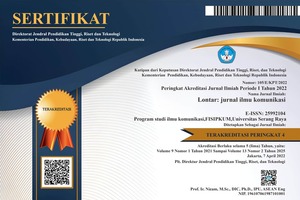Peran Kapitalisme Global Dalam Penyebaran Ideologi Radikal Di Media Sosial
DOI:
https://doi.org/10.30656/lontar.v6i2.951Abstract
The rapid development of information technology throughout the last few decades brings about a new color in the spread of information pattern. The availability of internet supported by the latest information technology, enables the media to spread information without limitation of space and time. Some issues addressed in this paper: how is the role of global capitalism in the spread of radical idelogy through social media? Furthermore, how is the inter-countries relation with regard to the spread of radical ideology? And what form of economy is created by the capitalisation of radical idelogy? Last but not least, what kind of actions being done by global network in order to advance security and to prevent the spread of radical ideology? The spread of radical ideology through social media has become study in contemporary global issues. This is because the relation of economy and political globalization is hardly separated. The economic gain of the global spread of radical ideology through social media will be qualitatively described in this paper. The act of spreading radical ideology using information technology brings benefit to the capitalist. Moreover, revolution of communication technology which also promotes globalization has raised awareness among nations: there is a problem that cannot be solved independently. Lastly, globalization also makes problem solving possible with the support of other countries.Keywords: Globalization, Radical Ideology, Social Media, Capitalism Global
Downloads
Published
Issue
Section
License
By submitting an article to the journal, the author(s) agree to transfer the published article's copyright to the journal, which will act as the publisher. This means the journal will have the right to publish the article in various forms, including reprints. The journal will maintain the publishing rights to the published articles.
In line with the license, authors and third parties (readers, researchers, and others) are allowed to share and adapt the material. In addition, the material must be given appropriate credit, provided with a link to the license, and indicated if changes were made. If authors remix, transform, or build upon the material, authors must distribute their contributions under the same license as the original.






